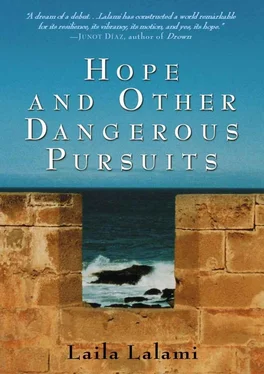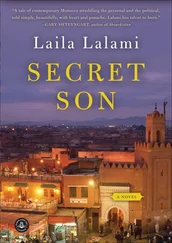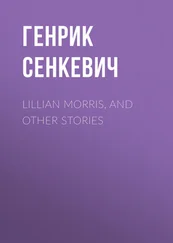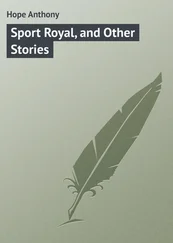“Let’s just take a look. How about that bracelet?”
“Oh, Chrissa,” Sandy said, her shoulders dropping slightly. “I don’t think it’d be appropriate for a wedding gift. Why don’t you get her something for the house?”
Chrissa sighed dramatically, as though she’d been rushed by Sandy all afternoon and had had enough. “Fine,” she said, walking from the jewelry case to the tables laden with souvenirs and knickknacks. Spotting a set of wooden tablets on a shelf, she squealed, “Look!”
Murad had purchased the tablets himself, on his boss’s behalf, at an estate sale a few weeks before. They had been used in Quranic schools until the 1940s, but now, of course, it was increasingly rare to find any. The back of one tablet bore the name of the boy who’d used it (Taher) and the date (1935). It was unusual to have identifying details like this because the tablets were often returned when children finished school and reused by other students. On the front, the boy had written a verse from Sura 96, the very first verse to be revealed to the Prophet: “Read, in the name of thy Lord, who created.” Murad had often wondered about the boy whose tablet had ended up at Botbol Bazaar and Gifts, whether he finished Quranic school and went on to public school or whether he’d been sent into an apprenticeship. He’d imagine Taher’s life, making up parents and friends for him — a father who’d fought on the side of Abdelkrim in the Rif rebellion; a mother who desperately wanted a daughter; five older brothers; a sebsi-smoking neighbor who taught him the flute and the guenbri at night; a crush on a girl who lived up the street from him.
Chrissa picked up the tablet and held it up to the light to examine the writing. “The calligraphy looks beautiful,” she said.
“I just love how the letters curve,” Sandy said approvingly.
“It’s an antique, I think.”
Stuffing her hands in her jeans pocket, Sandy whispered, “Don’t show too much interest, Chrissa, or they’ll jack up the price.” She affected a look of utter disinterest for the benefit of Anas, who sat in the corner watching them.
“Sorry,” Chrissa said. She seemed like the kind of woman who always apologized for something. She carefully put the tablet down on the table, then grabbed at her long hair and peeled it from her neck, wiping the sweat with her hand. “It might work, don’t you think,” she whispered in a conspiratorial tone, “above the console in the entrance?”
Sandy nodded in approval. “I bet your cousin will like it.”
But after staring at the tablet for a while, Chrissa moved on, Sandy shuffling behind her. “What’s wrong? You don’t like it anymore?” she asked.
“Sorry,” Chrissa said. “I just want to see what else they’ve got.”
“When we’re done here, let’s go check out Paul Bowles’s house,” Sandy said.
Murad wondered if it would ever be possible to get away from Bowles, from the dozens of tourists he seemed to inspire to come to Tangier, nostalgic for an era they never even knew. Was it his friendship with Kerouac and Ginsberg? The aura of mystery surrounding his marriage and his affairs? The myths he liked to create? Above all, Murad suspected, it was Bowles’s stories that brought them, year after year. There had been a time in Murad’s life when he’d used the author as bait, to lure tourists into guided tours of the city, but over time he’d grown weary of it.
He leaned with his elbows on the counter and opened his book again. He wanted to give the impression that he was lost in his reading, and he hoped that Anas, who was just now standing from the stool where he’d been perched, would take care of the two women so he wouldn’t have to.
“I hope it’s open to the public. Maybe we can take a picture there,” Sandy said. Tapping her burlap bag, she added, “I brought the camera.”
“I don’t feel very photogenic today.”
“Oh, stop it. You look fine.”
“You know, I don’t even think I’ve read anything by Bowles.”
“Are you serious? Not even The Sheltering Sky ?”
Chrissa shook her head. “Sorry.”
“Wow. Then we really should go. It’ll be fun, you’ll see.”
“So he lived here in Tangier?”
“Yep. Came here in the 1930s. It was Alice B. Toklas who advised him to go to Morocco,” Sandy said. “And Gertrude Stein agreed, so he ended up here.”
“Oh, really?” Chrissa said, absentmindedly. “Check this out.” She pointed to a solid brass, horseshoe-shape mirror that hung from the wall, and seeing her reflection, she brushed her brown hair away from her face and pulled at her shirt.
Murad had a hard time keeping up the pretense, the lines blurring again before his eyes as he caught himself eavesdropping on the women. He hadn’t indicated that he understood English, and even though Anas spoke Berber, Arabic, and Spanish, his English was limited to hello and good-bye. Eventually, Murad knew, if the women decided to buy something, he would have to disclose that he understood them, but for now he kept his eyes on his book even as he listened in.
“He lived here until his death.”
“Who?”
“Bowles!” Sandy replied, her tone rising with her exasperation.
“Sorry,” Chrissa said. “So he knew Morocco pretty well, then.”
“Better than the Moroccans themselves.”
WHEN HE WAS a little boy, Murad remembered, his father would sit down at night, cross-legged on the raffia mat, his back to the wall, and tell stories for him and for his sister Lamya. This was when the family still lived in the apartment downtown, before the birth of the twins and baby brother, before his father died and they had to move to the one-bedroom in the medina. He remembered the stories only in fragments, names like Juha and Aisha rising to his consciousness now, pieces of a puzzle that he couldn’t reconstruct. Realizing this, he felt at once angry and sad, as though he had just discovered that a part of him was missing. He stared at the page for a long time, trying to bring back the memory of a single story.
Childhood images of ogres and jinns flickered in his mind’s eye, but he could not hang on to any of them. His father started every story with “Kan, ya ma kan,” “Once there was and there was not.” The timeless opening line was fitting, it seemed to him, to the state he found himself in now, unable to ascertain whether the tales he remembered were real or figments of his imagination. The deep baritone of his father’s voice echoed in his ears, strong and reassuring, and finally one story slowly unraveled for him, the tale of Aisha Qandisha. For days after his father had told the story, Murad had had nightmares that the goat-footed ogress was running after him, calling out his name in a sweet voice, and he was tempted to turn around and look at her, but he couldn’t because he knew she would cast a spell on him.
“What do you think about this?” Chrissa asked. She pointed to a Berber rug hanging from the ceiling.
“It’s beautiful,” Sandy said. “Nice workmanship, too.”
“I just love the animal patterns,” Chrissa said. “It would be perfect as a wedding gift, wouldn’t it?”
“Careful, you’re being too eager,” Sandy said.
“Hello,” Anas said.
“See,” Sandy said. She smiled at Anas, but with a distance that suggested she was not interested so please don’t even start. Anas smiled blithely, the extent of his English having been exhausted. He wore a football shirt and washed-out jeans, and he shuffled in his yellow belgha to the light switch, which he turned on, illuminating the display cases. He gestured with his hand that the women were welcome to explore the merchandise upstairs, but they remained where they were, undecided about the rug.
Читать дальше












